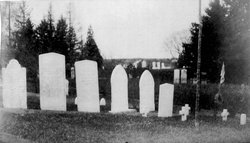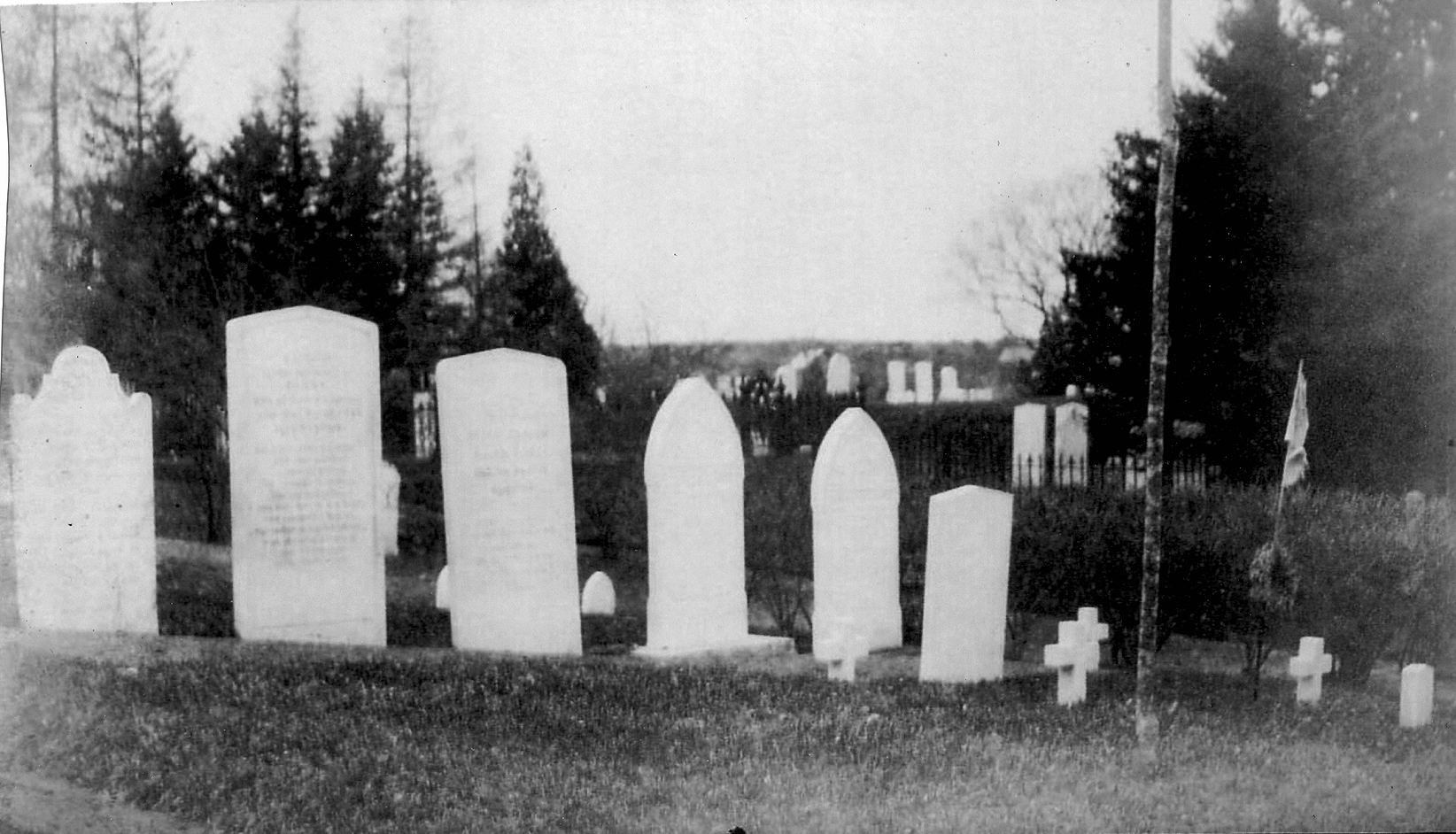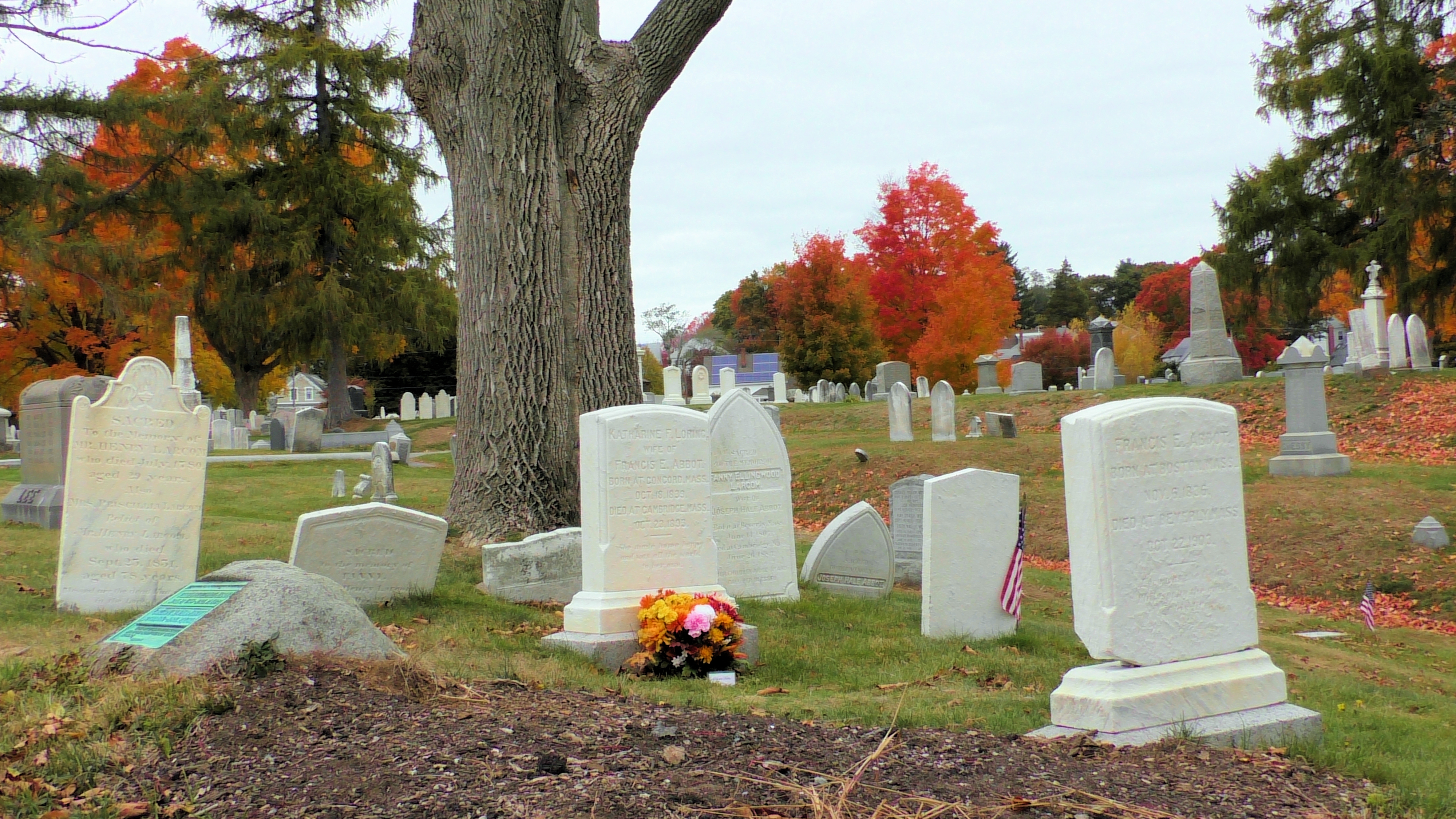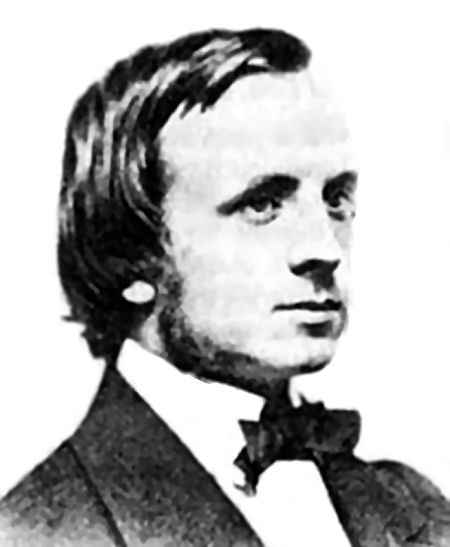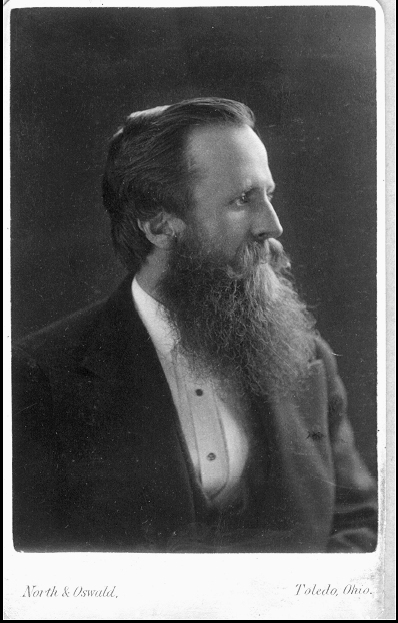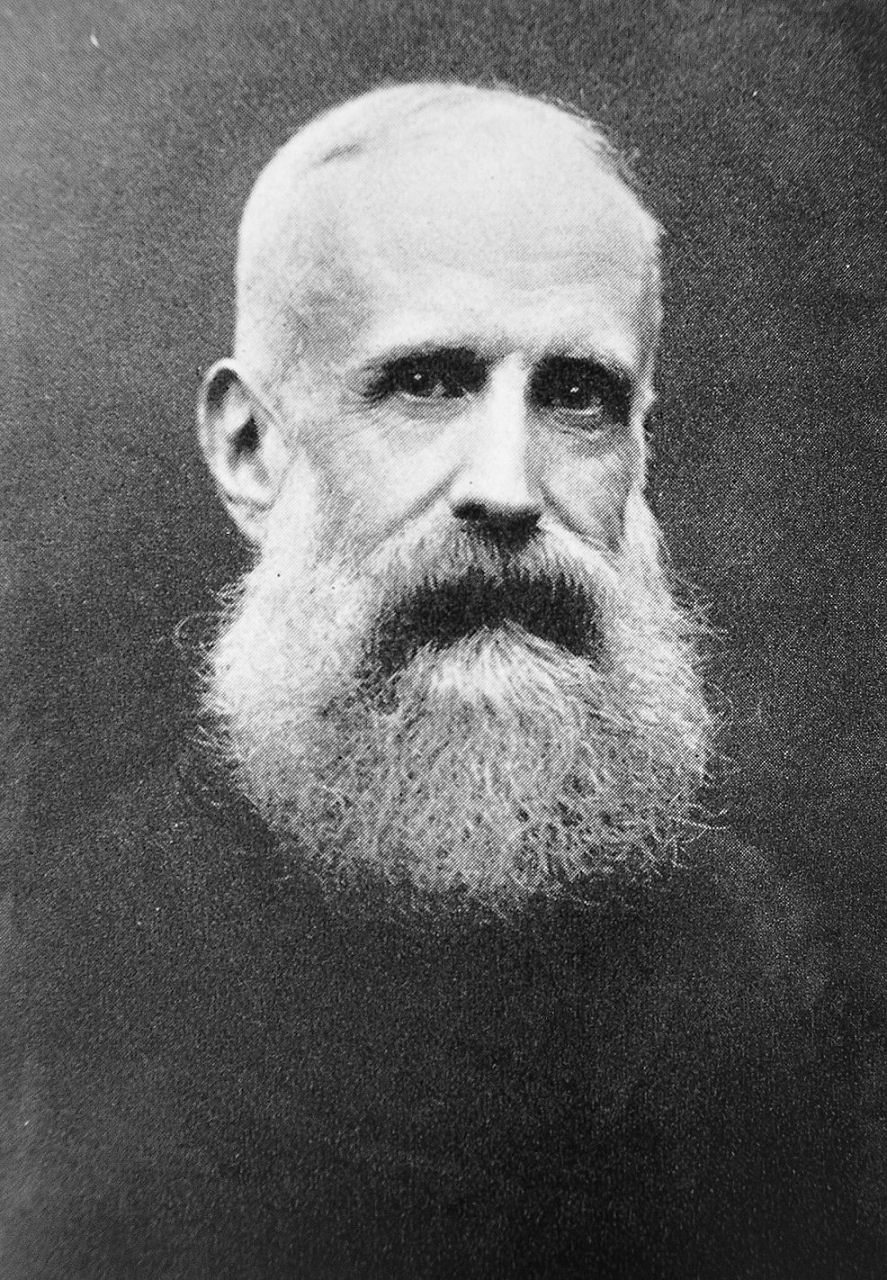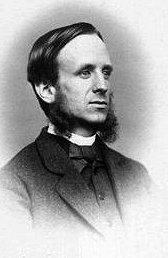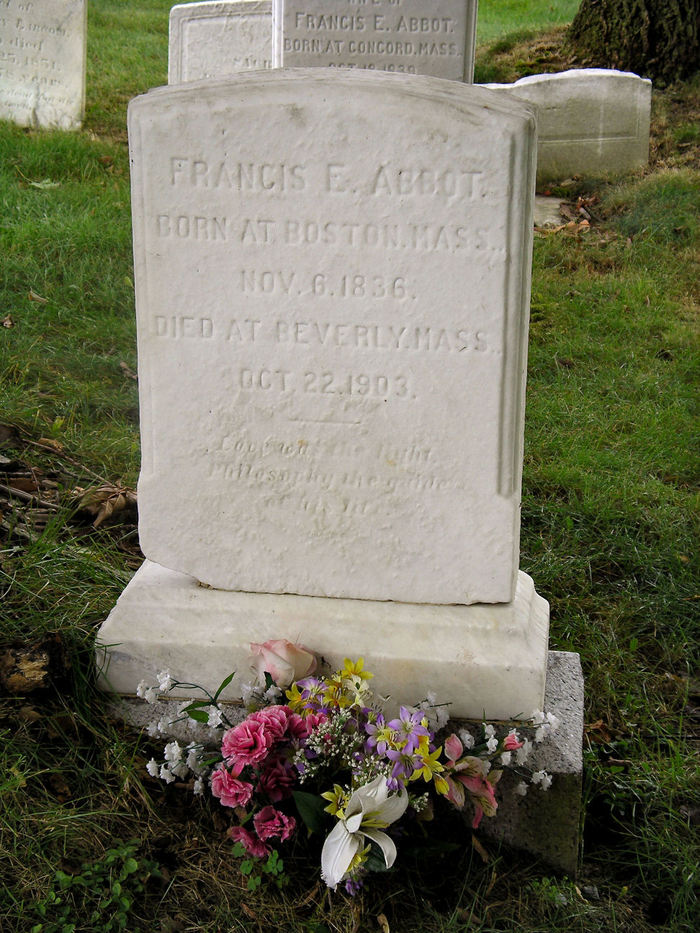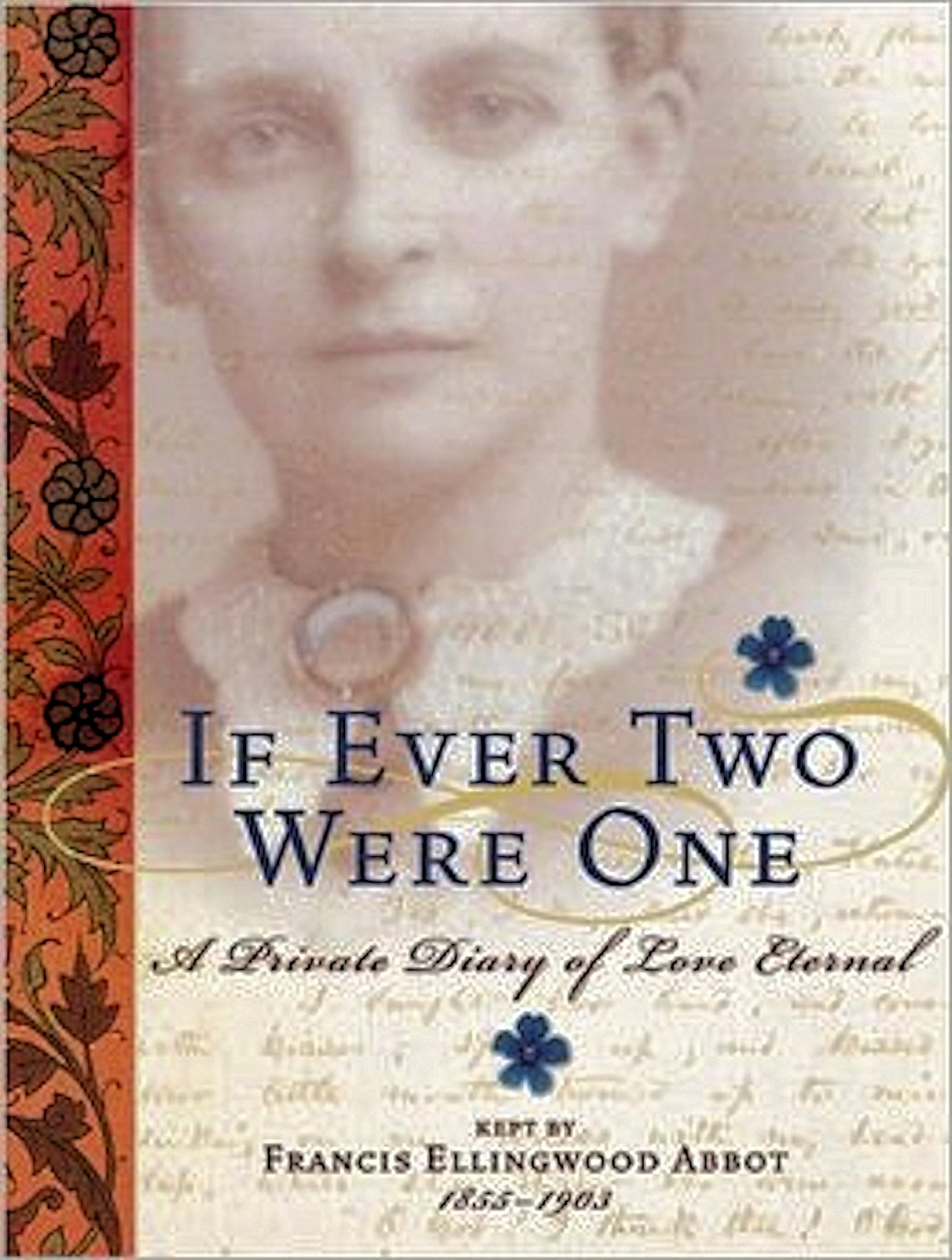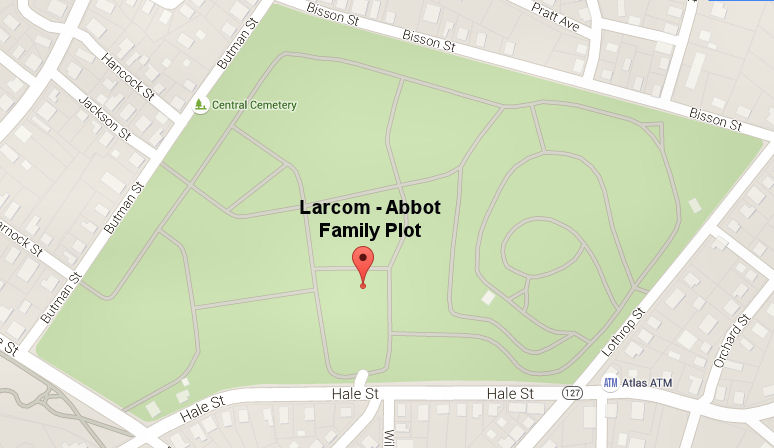Francis Ellingwood Abbot, Ph.D., a life member of this Society, elected in 1892, was born in Boston, November 6, 1836, the son of Joseph Hale and Fanny Ellingwood (Larcom) Abbot. He was a descendant from George1 Abbot (1615-1681), who was at Andover between 1640 and 1650, through John [2] (1648-1721), John [3](1674-1754), John [4] (1704-1793), Abiel [5] (1741-1809), Ezra [8] (1772-1847), Joseph Hale [7] (1802-1873).
He was prepared for college at the Boston Latin School, and graduated at Harvard in 1859 with high rank, being a member of the Phi Beta Kappa.
He graduated at the Meadville Theological School in 1863, and soon identified himself with the more radical branch of the Unitarian body. Objections were made to him on this ground in his parish at Dover, New Hampshire, and these led ultimately to his being legally displaced from his pulpit, after four years occupation of it (August 31, 1864, to April 1, 1868), by the decision of the Supreme Court of New Hampshire, on the ground that the word Unitarian could not be legally regarded as including those representing, like him, a faith wider than Christianity proper. He became for a time minister of a Free Religious Society in Dover (April - October, 1868), and during the following year of a similar society in Toledo, Ohio (September 1, 1869, to March 16, 1873). He also edited for ten years an independent weekly newspaper, "The Index," which he took to Boston with him on leaving Toledo in 1873, a paper characteristic of the time and well worth preserving. Retiring from the pulpit, he naturally resorted to teaching for an employment, belonging to a family long distinguished in that vocation in New England. He took pupils for a short time in New York City, and then for many years in Cambridge, Massachusetts, which was thenceforward his home. He was always a laborious student, especially in the department of philosophy, received the Harvard degree of Ph.D. in 1881, ( and took, two years later, the temporary charge of Prof. Royce's classes at that University during the absence of their regular instructor, with whom he afterwards had some controversy as to their respective methods of thought and instruction. During the later years of his life he took no pupils, but devoted himself entirely to the completion of a larger philosophical work, having previously published only smaller ones, such as " Equal Rights in Religion " (1886), "Scientific Theism" (1885), and "The Way out of Agnosticism" (1890), besides contributions to periodical literature. He died October 23, 1903, in the cemetery at Beverly, Massachusetts, on the grave of his wife, where he first placed a bouquet of flowers and then took his own life.
His purely intellectual standing will necessarily be determined by the verdict of thinkers upon his life work, " The Syllogistic Philosophy or Prolegomena to Science," when published. As to his personal character, it was recognized by all as being absolutely conscientious, truthful, courageous, unworldly, and in many respects very lovable. He had, however, a temperament somewhat peculiar, including an almost morbid conscientiousness, to which small differences of opinion were liable to seem as important and even vital as larger ones; so that he usually found it hard to work long in full alliance with others, no matter how close may have been the preceding relations between them. He was at such times conscientiously outspoken, and was the first to emphasize his divergence from his nearest friends and allies on points which had, perhaps, seemed to them quite unimportant. Thus he withdrew himself from the Free Religious Association, of which he was one of the three or four founders, because of a difference of construction as to its fundamental principles. He was president of the Society of Colonial Wars, but when that society declined to give up its annual dinners and devote the money to building monuments he lost all interest in it, and ultimately withdrew.
This peculiar temperament inevitably made his life, in some degree, a lonely one, and more so as time went on; while he at the same time ardently desired sympathy and was only the victim of an overpowering conscience. His domestic life was fortunately untouched by this trait, and he could hardly be surpassed in absolute fidelity to his home and household, this being repaid by such sympathy that the best report of his main ideas, up to the present time, may be found in the singularly clear and logical little essay of his daughter, Miss F. L. Abbot, entitled "Faith Built on Reason" (Boston, James II. West Company, 1902). Nor did he ever lose the personal regard and even affection of those from whom lie was temporarily separated in thought; and the testimonials to his character after his death were singularly warm and affectionate, even from those who did not share his opinions and who perhaps had not met him for years. Such was the case, for instance, with men like Rev. W. R. Huntington, an Episcopalian, and Rev. William Everett, a conservative Unitarian. Whatever of sadness there may have been connected with his death, it must be remembered only in connection with the words which he himself had written to a friend only a week before his death : "Do not think that I despair. God is ! How can I despair? Doing right is worth all that it costs and
my whole being asks no more."
By Thomas Wentworth Higginson, LL.D.
~~~~~
Entry from: Brown, John Howard. Lamb's Biographical Dictionary of the United States. Boston, Mass.: James H. Lamb, 1900-03.
"Abbot, Francis Ellingwood, author, was born in Boston, Mass., Nov. 6, 1836; son of Joseph Hale and Fanny Ellingwood (Larcom) Abbot; grandson of Deacon Ezra Abbot of Wilton, N.H., and a descendant of three of the four "old planters" of the Massachusetts colony at Cape Ann and Salem, 1625-'26, namely, Roger Conant, John Balch, and John Woodbury; and of the Rev. John Hale, first minister of Beverly, 1667-1700. He attended the Boston Latin school and was graduated from Harvard in 1859, and from the Meadville theological school in 1863. He was pastor of the Unitarian society at Dover, N.H., 1864-'68, and of Independent societies at Dover and Toledo, Ohio, Jan, 1, 1870, and published at Boston, Mass., 1878-'80. He was teacher of a classical school in New York, 1880-'81; and of a private "Home for Boys" at Cambridge, Mass., 1881-'92. He retired in 1892. He received the degree of Ph.D. and A.M. in philosophy from Harvard in 1881. He was married Aug. 8, 1859, to Katherine Fearing Loring of Concord, Mass. He is the author of "Scientific Theism" (1885) ; and "The Way out of Agnosticism, or the Philosophy of Free Religion" (1890). He edited in 1899, as literary executor, "Poems of Nature and Life," by John Witt Randall, with an introduction on "The Randall Family." He also contributed philosophical and religious articles to The North American Review, and other periodicals."
~~~~~
Highly recommended further reading:
Sullivan, Brian, ed. _If Ever Two Were One: A Private Diary of Love Eternal Kept by Francis Ellingwood Abbot, 1855-1903_. New York: Regan Books, 2004.
Recounts through letters, diary entries and photographs the story of Abbot's life and incredible life-long love affair with his wife, Katy.
Includes details of Abbot's inter-action with leading thinkers of his day including Emerson, Darwin and Thoreau (in whose mother's home Abbot boarded while teaching in Concord and often shared the table with Henry David Thoreau at meals.)
Also details Abbot's thoughts and preparations leading up to the taking of his own life in 1903 on the tenth anniversary of his wife's death on her grave in Central Cemetery, Beverly, MA.
*****∼death date above is actually date of cremation
Francis Ellingwood Abbot, Ph.D., a life member of this Society, elected in 1892, was born in Boston, November 6, 1836, the son of Joseph Hale and Fanny Ellingwood (Larcom) Abbot. He was a descendant from George1 Abbot (1615-1681), who was at Andover between 1640 and 1650, through John [2] (1648-1721), John [3](1674-1754), John [4] (1704-1793), Abiel [5] (1741-1809), Ezra [8] (1772-1847), Joseph Hale [7] (1802-1873).
He was prepared for college at the Boston Latin School, and graduated at Harvard in 1859 with high rank, being a member of the Phi Beta Kappa.
He graduated at the Meadville Theological School in 1863, and soon identified himself with the more radical branch of the Unitarian body. Objections were made to him on this ground in his parish at Dover, New Hampshire, and these led ultimately to his being legally displaced from his pulpit, after four years occupation of it (August 31, 1864, to April 1, 1868), by the decision of the Supreme Court of New Hampshire, on the ground that the word Unitarian could not be legally regarded as including those representing, like him, a faith wider than Christianity proper. He became for a time minister of a Free Religious Society in Dover (April - October, 1868), and during the following year of a similar society in Toledo, Ohio (September 1, 1869, to March 16, 1873). He also edited for ten years an independent weekly newspaper, "The Index," which he took to Boston with him on leaving Toledo in 1873, a paper characteristic of the time and well worth preserving. Retiring from the pulpit, he naturally resorted to teaching for an employment, belonging to a family long distinguished in that vocation in New England. He took pupils for a short time in New York City, and then for many years in Cambridge, Massachusetts, which was thenceforward his home. He was always a laborious student, especially in the department of philosophy, received the Harvard degree of Ph.D. in 1881, ( and took, two years later, the temporary charge of Prof. Royce's classes at that University during the absence of their regular instructor, with whom he afterwards had some controversy as to their respective methods of thought and instruction. During the later years of his life he took no pupils, but devoted himself entirely to the completion of a larger philosophical work, having previously published only smaller ones, such as " Equal Rights in Religion " (1886), "Scientific Theism" (1885), and "The Way out of Agnosticism" (1890), besides contributions to periodical literature. He died October 23, 1903, in the cemetery at Beverly, Massachusetts, on the grave of his wife, where he first placed a bouquet of flowers and then took his own life.
His purely intellectual standing will necessarily be determined by the verdict of thinkers upon his life work, " The Syllogistic Philosophy or Prolegomena to Science," when published. As to his personal character, it was recognized by all as being absolutely conscientious, truthful, courageous, unworldly, and in many respects very lovable. He had, however, a temperament somewhat peculiar, including an almost morbid conscientiousness, to which small differences of opinion were liable to seem as important and even vital as larger ones; so that he usually found it hard to work long in full alliance with others, no matter how close may have been the preceding relations between them. He was at such times conscientiously outspoken, and was the first to emphasize his divergence from his nearest friends and allies on points which had, perhaps, seemed to them quite unimportant. Thus he withdrew himself from the Free Religious Association, of which he was one of the three or four founders, because of a difference of construction as to its fundamental principles. He was president of the Society of Colonial Wars, but when that society declined to give up its annual dinners and devote the money to building monuments he lost all interest in it, and ultimately withdrew.
This peculiar temperament inevitably made his life, in some degree, a lonely one, and more so as time went on; while he at the same time ardently desired sympathy and was only the victim of an overpowering conscience. His domestic life was fortunately untouched by this trait, and he could hardly be surpassed in absolute fidelity to his home and household, this being repaid by such sympathy that the best report of his main ideas, up to the present time, may be found in the singularly clear and logical little essay of his daughter, Miss F. L. Abbot, entitled "Faith Built on Reason" (Boston, James II. West Company, 1902). Nor did he ever lose the personal regard and even affection of those from whom lie was temporarily separated in thought; and the testimonials to his character after his death were singularly warm and affectionate, even from those who did not share his opinions and who perhaps had not met him for years. Such was the case, for instance, with men like Rev. W. R. Huntington, an Episcopalian, and Rev. William Everett, a conservative Unitarian. Whatever of sadness there may have been connected with his death, it must be remembered only in connection with the words which he himself had written to a friend only a week before his death : "Do not think that I despair. God is ! How can I despair? Doing right is worth all that it costs and
my whole being asks no more."
By Thomas Wentworth Higginson, LL.D.
~~~~~
Entry from: Brown, John Howard. Lamb's Biographical Dictionary of the United States. Boston, Mass.: James H. Lamb, 1900-03.
"Abbot, Francis Ellingwood, author, was born in Boston, Mass., Nov. 6, 1836; son of Joseph Hale and Fanny Ellingwood (Larcom) Abbot; grandson of Deacon Ezra Abbot of Wilton, N.H., and a descendant of three of the four "old planters" of the Massachusetts colony at Cape Ann and Salem, 1625-'26, namely, Roger Conant, John Balch, and John Woodbury; and of the Rev. John Hale, first minister of Beverly, 1667-1700. He attended the Boston Latin school and was graduated from Harvard in 1859, and from the Meadville theological school in 1863. He was pastor of the Unitarian society at Dover, N.H., 1864-'68, and of Independent societies at Dover and Toledo, Ohio, Jan, 1, 1870, and published at Boston, Mass., 1878-'80. He was teacher of a classical school in New York, 1880-'81; and of a private "Home for Boys" at Cambridge, Mass., 1881-'92. He retired in 1892. He received the degree of Ph.D. and A.M. in philosophy from Harvard in 1881. He was married Aug. 8, 1859, to Katherine Fearing Loring of Concord, Mass. He is the author of "Scientific Theism" (1885) ; and "The Way out of Agnosticism, or the Philosophy of Free Religion" (1890). He edited in 1899, as literary executor, "Poems of Nature and Life," by John Witt Randall, with an introduction on "The Randall Family." He also contributed philosophical and religious articles to The North American Review, and other periodicals."
~~~~~
Highly recommended further reading:
Sullivan, Brian, ed. _If Ever Two Were One: A Private Diary of Love Eternal Kept by Francis Ellingwood Abbot, 1855-1903_. New York: Regan Books, 2004.
Recounts through letters, diary entries and photographs the story of Abbot's life and incredible life-long love affair with his wife, Katy.
Includes details of Abbot's inter-action with leading thinkers of his day including Emerson, Darwin and Thoreau (in whose mother's home Abbot boarded while teaching in Concord and often shared the table with Henry David Thoreau at meals.)
Also details Abbot's thoughts and preparations leading up to the taking of his own life in 1903 on the tenth anniversary of his wife's death on her grave in Central Cemetery, Beverly, MA.
*****∼death date above is actually date of cremation
